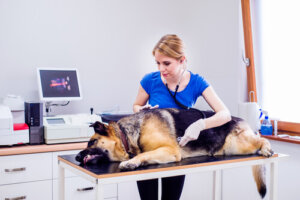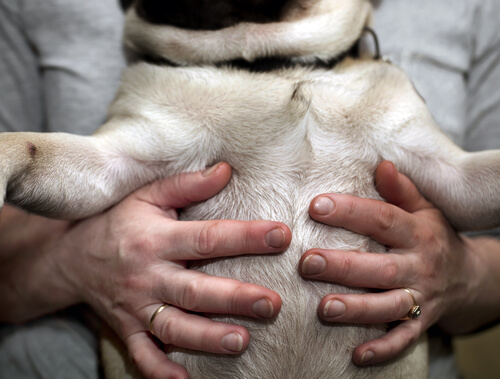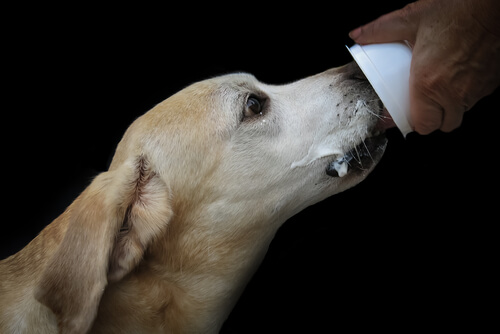3 Natural Remedies to Help your Dog's Digestion


Written and verified by the biotechnologist Alejandro Rodríguez
Just like with humans, sometimes digestive problems can affect our pets too. Fortunately, we have at our disposal a series of tips and remedies that play in our favor if we want to help our dog’s digestion processes.
Digestion in dogs
Despite being mammals, humans and dogs don’t digest food in the same way. One of the biological reasons for this difference is their carnivorous origin. This trait can be seen at a glance in their mouth, which contains more teeth and whose mission is to tear off and start ‘chewing’ the food.
A key feature in the canine digestion process is the lack of digestive enzymes in the saliva. When we chew, these enzymes take care of the first digestion and, when the food reaches the stomach, the rest of the digestion and nutrient absorption process is more direct.
However, the bulk of the digestive work in dogs is carried out in the stomach and associated organs: liver, pancreas, etc. This is why the acids secreted are much stronger, which facilitates the digestion of food, mainly meat.

In spite of all this, your dog may suffer some eating disorders, so we’re going to propose some remedies to help your dog’s digestion.
Fasting: how to help your dog’s digestion
It may not seem a remedy in itself, but it is one of the first measures you should take, and one of the fastest and most effective. Normally, fasting is usually resorted to after poor digestion, which often leads to diarrhea and vomiting. Therefore, to help your dog’s digestion, sometimes the best thing to do is to let their stomach rest.
If your pet has digestive problems, a fast of 12 to 24 hours would be ideal. After this, we should give them a soft diet and increase more solid food gradually. This method can be extended for a couple of days, until we check that the dog’s digestion is restored.
Probiotics: allies of digestion
Probiotics are another natural remedy that can help your dog’s digestion, but what are probiotics? First of all, they’re natural foods, as they’re living microorganisms. By incorporating them into the diet, they bring great benefits by contributing to the maintenance of the intestinal flora.

Many foods are a source of probiotics: yogurt, kefir, and sauerkraut, for example. If we consider the foods that our pets can take, yogurt is the best option.
Of course, it must be administered in controlled doses, and we need to ensure that our dog tolerates it well. The beneficial bacteria contained in the yogurt will be released and this will replenish the flora and help digestion.
Quality food to aid digestion
It may seem simple, but a good natural remedy to aid digestion is to give good, regular meals. For example, choosing the right food is important; we must make sure that the one we choose contains food that the dog can easily digest, while providing all the necessary nutrients. Your veterinarian can guide you in this regard.
As far as possible, it’s advisable to maintain a certain regularity in our pet’s diet. This means that regular amounts and with more or less established schedules can help digestion to some extent.
Avoid all prohibited foods for dogs at all costs, as this type of food damages the canine digestive system. Regarding treats and prizes, although they’re a positive reinforcement, you shouldn’t give them too regularly.
Just like with humans, sometimes digestive problems can affect our pets too. Fortunately, we have at our disposal a series of tips and remedies that play in our favor if we want to help our dog’s digestion processes.
Digestion in dogs
Despite being mammals, humans and dogs don’t digest food in the same way. One of the biological reasons for this difference is their carnivorous origin. This trait can be seen at a glance in their mouth, which contains more teeth and whose mission is to tear off and start ‘chewing’ the food.
A key feature in the canine digestion process is the lack of digestive enzymes in the saliva. When we chew, these enzymes take care of the first digestion and, when the food reaches the stomach, the rest of the digestion and nutrient absorption process is more direct.
However, the bulk of the digestive work in dogs is carried out in the stomach and associated organs: liver, pancreas, etc. This is why the acids secreted are much stronger, which facilitates the digestion of food, mainly meat.

In spite of all this, your dog may suffer some eating disorders, so we’re going to propose some remedies to help your dog’s digestion.
Fasting: how to help your dog’s digestion
It may not seem a remedy in itself, but it is one of the first measures you should take, and one of the fastest and most effective. Normally, fasting is usually resorted to after poor digestion, which often leads to diarrhea and vomiting. Therefore, to help your dog’s digestion, sometimes the best thing to do is to let their stomach rest.
If your pet has digestive problems, a fast of 12 to 24 hours would be ideal. After this, we should give them a soft diet and increase more solid food gradually. This method can be extended for a couple of days, until we check that the dog’s digestion is restored.
Probiotics: allies of digestion
Probiotics are another natural remedy that can help your dog’s digestion, but what are probiotics? First of all, they’re natural foods, as they’re living microorganisms. By incorporating them into the diet, they bring great benefits by contributing to the maintenance of the intestinal flora.

Many foods are a source of probiotics: yogurt, kefir, and sauerkraut, for example. If we consider the foods that our pets can take, yogurt is the best option.
Of course, it must be administered in controlled doses, and we need to ensure that our dog tolerates it well. The beneficial bacteria contained in the yogurt will be released and this will replenish the flora and help digestion.
Quality food to aid digestion
It may seem simple, but a good natural remedy to aid digestion is to give good, regular meals. For example, choosing the right food is important; we must make sure that the one we choose contains food that the dog can easily digest, while providing all the necessary nutrients. Your veterinarian can guide you in this regard.
As far as possible, it’s advisable to maintain a certain regularity in our pet’s diet. This means that regular amounts and with more or less established schedules can help digestion to some extent.
Avoid all prohibited foods for dogs at all costs, as this type of food damages the canine digestive system. Regarding treats and prizes, although they’re a positive reinforcement, you shouldn’t give them too regularly.
All cited sources were thoroughly reviewed by our team to ensure their quality, reliability, currency, and validity. The bibliography of this article was considered reliable and of academic or scientific accuracy.
- Wynn, S. G. (2009). Probiotics in veterinary practice. Journal of the American Veterinary Medical Association, 234(5), 606-613.
- Stevens, C. E., & Hume, I. D. (2004). Comparative physiology of the vertebrate digestive system. Cambridge University Press.
- Biourge, V., Vallet, C., Levesque, A., Sergheraert, R., Chevalier, S., & Roberton, J. L. (1998). The use of probiotics in the diet of dogs. The Journal of nutrition, 128(12), 2730S-2732S.
- International Association of Animal Behavior Consultants. (2019). Manual de Entrenamiento Canino. Chile:IAABC.
This text is provided for informational purposes only and does not replace consultation with a professional. If in doubt, consult your specialist.








